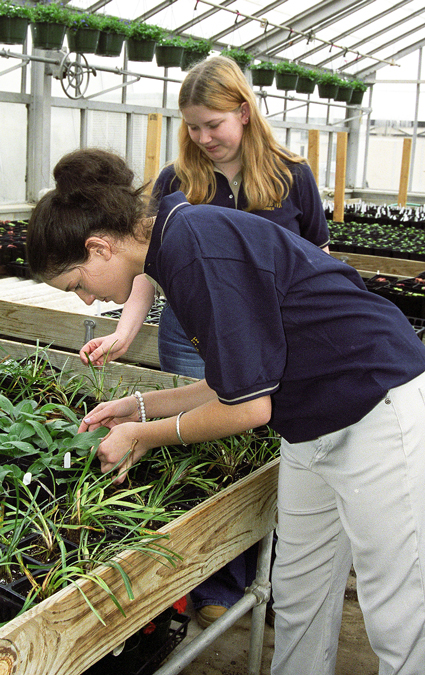Over the last several years, there’s been a lot of talk in the horticulture industry about Millennials—those people Pew Research pegs as born between 1981 and 1996. The interest in a younger generation is understandable. For decades, now-aging Baby Boomers were the cornerstone of the horticulture industry—as both employees and consumers.
But now, the industry is facing a new age. Greenhouse and nursery owners are growing older. New generations have or will take control. In many cases, succession is bearing down rapidly—even though no one’s there to take over. A recent 2021 nursery industry survey reports that reaching a younger generation remains a significant concern for many of you.
Until now, Millennials have been the generation the horticulture industry looked to next. But that’s changing, too. It may surprise you to realize the oldest Millennials turn 40 years old this year. And while many people still look to “Middle-Aged Millennials,” another generation of potential employees and consumers is already here.

The post-Millennials—known as Generation Z or Gen Z for short—are coming on quickly. As the oldest Gen Zers turn 24 years old, they comprise a significant segment of 2020’s new gardeners who came back for more in 2021. This younger generation displays tremendous interest in horticulture, but not just for gardening. They’re also exploring horticulture for careers.
Whether you’re interested in attracting new talent or cultivating customers for plants and services, these insights into Gen Z can help:
Numbers and Influence
- According to Pew, Gen Z will soon surpass Millennials as America’s largest and most racially and ethnically diverse generation ever. Some sources say Gen Z has already taken the lead—and the segment is set to grow through immigration.
- Despite their youth, Gen Z already comprises a large segment of American consumers. According to Forbes, 40% of all U.S. consumers fall in this age category, wielding clout of up to $143 billion in direct spending.
- On top of direct spending, consider the influence young Gen Zers have on their parents’ buying habits. Ninety-three percent of parents indicate their children influence family and household purchases significantly.
- Not surprisingly, Gen Z is on track to surpass Millennials in income over the next decade. A recent Bank of America report estimates Gen Z’s will soon account for nearly 30% of global income, surpassing Millennials by 2031.
Employment and Education
- Qualities Gen Z seeks in employers echo the attributes they want in brands: shared values, sincerity, authenticity, reliability, and trustworthiness all rank high. So does a potential employer’s track record on sustainability.
- As Gen Z enters the workforce, the effect of COVID-19 lingers. In contrast to Millennials—once famous for workplace perks like catered lunches, nap stations and game rooms—Gen Zers express more concern for health insurance and retirement benefits.
- Despite remote pandemic learning, Gen Z is expected to become the most well-educated generation in history. Access and familiarity with technology and rapid information gathering is key. Technology isn’t just second nature to Gen Z—it’s first nature. Even so, personal connections and community matter deeply.

- Gen Z wants to know the “why” behind something, not just the “how.” That holds whether learning new work tasks or attending weekend gardening seminars. Ninety-three percent of Gen Z workers say they devote their own time to learn new, career-advancing skills.
Passions and Purchasing
- Gen Z has already earned the nickname “Sustainability Generation.” They have a broad understanding of sustainability and U.N. Sustainable Development Goals—from environmental issues and climate change to gender equality and quality education.
- Volunteerism and activism are central issues for Gen Z. They actively pursue opportunities to volunteer and get involved, especially on issues linked to sustainability and environmental goals. They appreciate employers who do the same.

- Gen Z is more likely to make buying decisions based on personal, social and environmental values and principles than previous generations—including Millennials. They research extensively and rarely make uninformed impulse buys.
- More specifically, a company’s sustainable practices hold more weight with Gen Z’s purchasing decisions than with any previous generation. A majority of this generation prefer to buy sustainable brands. Research shows they're willing to pay 10 percent more for sustainably produced products, too.
With Generation Z already entering the workforce and consumer public, it pays to survey the landscape, look around your operation, and take note. You may be thinking ahead to a new generation of sustainability-minded consumers or setting your sights on tech-savvy, well-educated hires. Either way, understanding up-and-coming Gen Zers can help you prepare.
At ICL, we already see the impact Generation Z is having on sustainability, innovation, research, and growth. We’ve been here for generations of professional growers that went before, and we’ll be here for those ahead. You can count on it, so give us call. Let’s talk about what’s next.
